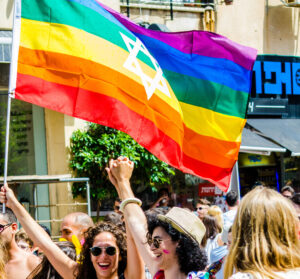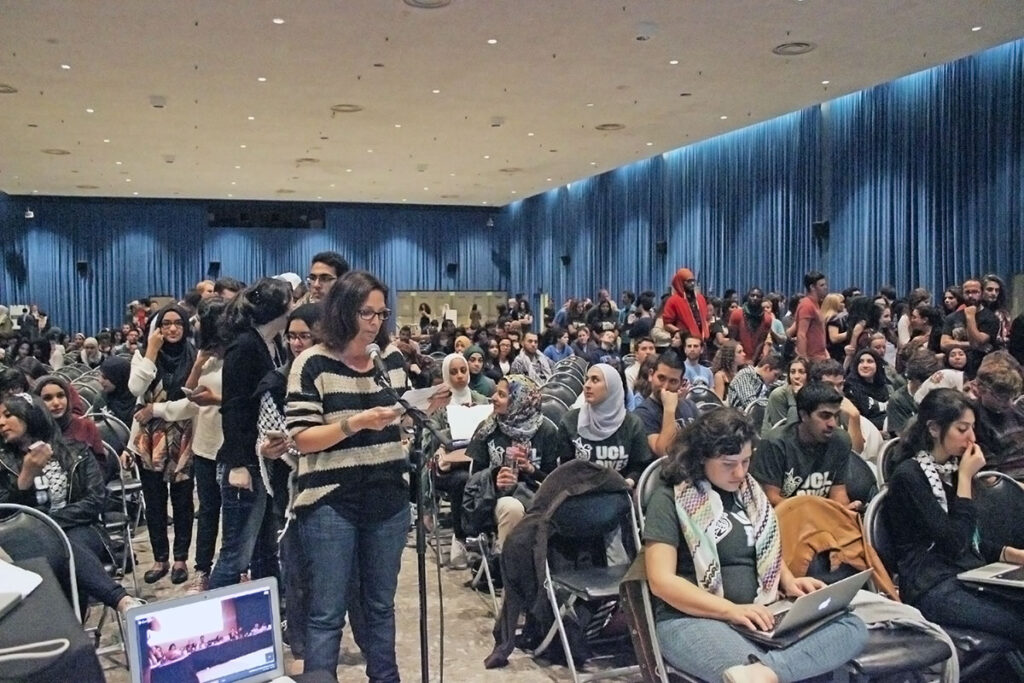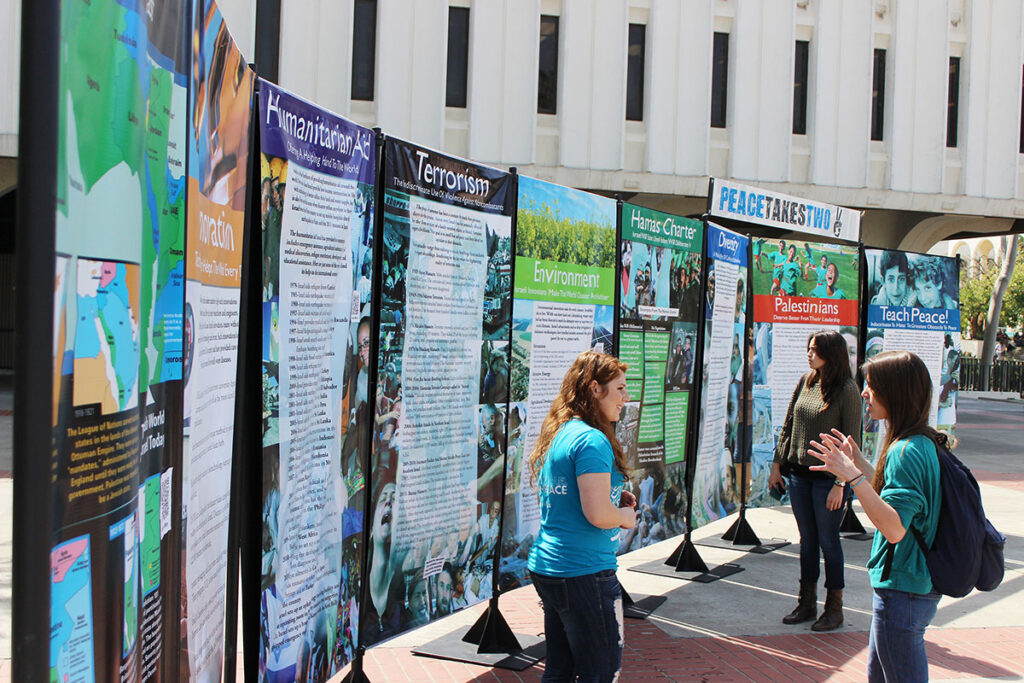
LGBTQ Rights
BOOK SERIES LGBTQ RIGHTS In Israel and the Middle East Israel Is a Sanctuary for the LGBTQ Community Share on facebook Share on twitter Share
BOOKLET SERIES
COUNTERING ANTI-ISRAEL BOYCOTTS ON CAMPUS
We oppose a Jewish state in any part of Palestine.
 BDS is a global campaign to boycott, divest from, and sanction Israel.
BDS is a global campaign to boycott, divest from, and sanction Israel.
BDS seeks to undermine international support for Israel and eventually eliminate the Jewish state.
BDS goes far beyond legitimate criticism of Israeli policy, often blurring the line between anti-Zionism and anti-Semitism. It dehumanizes Israelis and their supporters, seeks to deny Jews the right to self-determination in their ancestral homeland, and hurts Israelis and Palestinians alike. Ultimately, BDS hopes to weaken Israel politically, culturally, and economically in order to set the stage for its collapse.
BDS claims its purpose is to help Palestinians achieve freedom and equal rights, but its goals prove this to be false. BDS’ main stated goal is to apply pressure until millions of Palestinians who currently live as refugees in Arab countries are allowed to move into Israel, rather than into a future Palestinian state. In effect, this would turn Israeli Jews back into a stateless minority and end Israel’s existence as a Jewish state.
While it pressures businesses, artists, churches, professional associations, labor unions, local governments, and other institutions, BDS’ biggest focus is the college campus. It masks its bigoted agenda in the appealing language of social justice and human rights, seeking to poison future social and political leaders against Israel.
Together we can defeat bigotry and stand up for justice.
The following pages contain insights aimed at empowering pro-Israel students to defeat BDS and implement a proactive strategy of their own. Together we can overcome the challenge BDS poses to our communities on campuses, stand up for Jewish rights, deepen the U.S.- Israel relationship, and support a truly just peace between Israelis and Palestinians.
BDS on campuses usually exists in the form of campaigns by Students for Justice in Palestine (SJP) and similar groups. SJP has over 150 chapters at universities across North America. The most damaging campaigns organized by SJP are student government resolutions and student body-wide referendums calling on universities to stop investing in companies doing business with Israel. This is known as divestment. Other campaigns include “apartheid wall” displays, theatrical protests, BDS “teach-ins”, and tours by anti-Israel speakers.
Student groups like SJP are the face of the movement on campuses, but they receive funding, training, research, talking points, and legal support from numerous professional off-campus political interest groups. These outside groups include American Muslims for Palestine (AMP), the U.S. Campaign for Palestinian Rights, the American Friends Service Committee, Jewish Voice for Peace (JVP), Palestine Legal, Al-Awda, and others.
SJP used to focus on protests, public displays, and hosting campus events, which gained it some supporters but was not especially effective overall. Divestment is a higher level of activism. It is more strategic. It combines:
• coalition building with influential minority groups;
• lobbying student senators;
• broad PR campaigns on campus; and
• drawing in media attention.
With divestment, SJP seeks to have a deeper and wider influence on future leaders and opinion-makers.
On the surface, SJP is calling for universities to take financial action against Israel, but its real goal is to turn popular opinion against Israel. It is using financial issues as an excuse to spread anti-Israel propaganda in student governments, among influential student groups, in the media, and elsewhere.
SJPs have a simple narrative that is easy to relate to, and they cloak their anti-Israel message in the language of human rights and social justice. They use lies and halftruths along with emotional images and stories to sway the public – particularly people on the left side of the political spectrum.

Most divestment campaigns come in the form of student government legislation. SJP often writes a bill claiming that certain international companies (particularly those involved in Israel’s self-defense against terrorism) are helping Israel commit crimes against the Palestinians and calling on the university to stop investing in those companies. Student councils, which usually consist of 10 to 30 elected student leaders, are forced to vote on these bills, resulting in hours or weeks of debate, during which Israel is essentially put on trial.
A referendum is a general election in which all students can vote on the question of whether or not the university should divest from companies doing business with Israel. SJP runs mass social media campaigns, writes student newspaper articles, and speaks with large numbers of students in person, hoping to mislead and manipulate them into voting in favor of divestment. Divestment is often a win-win for SJP. If divestment passes, SJP claims that the majority of the student body opposes Israel. If it doesn’t, SJP still reaches many new people with its propaganda and moves closer to its goal of turning public opinion against Israel over the long term. Vote counts do not always decide whether we win or lose. Defeating divestment is about more than just winning a senate or referendum vote. It’s about winning the moral debate about Israel and what real justice in the Middle East looks like. Winning the divestment debate but losing the moral debate is like winning the battle but losing the war.

BDS has a long-term strategy. We need to implement one of our own.
Join a pro-Israel group on campus or create your own. Many campuses have existing pro-Israel organizations that you can join. If there is no existing group, StandWithUs campus staff can help you create one.
Start at the foundation: What identity are we creating for Israel and ourselves on campus? Before you do anything, figure out what identity you want to create for Israel on your campus. We must have a message that students can connect to personally, emotionally, and intellectually. SJP associates Israel with powerful, negative emotions and stereotypes, so we have to be proactive about tying Israel to resilience, empowerment, diversity, creativity, and other positives. Furthermore, you should proactively position your community as the one that wants a StandWithUs’ “Israel Matters” display, which travels to North American college campuses to educate about Israel. better future for both Israelis and Palestinians, as opposed to BDS, which seeks to bring down only Israel. Your events, flyers, messaging, and tangible goals throughout the year should be guided by the larger story you’re trying to tell.
Educate yourself and your community about the Arab-Israeli conflict and other difficult issues. Your main focus must always be communicating a positive message, but it’s also important to know how to have intelligent discussions and debates about the Arab-Israeli conflict and other challenges that Israel faces. We have to be able to show people the difference between legitimate criticism of Israel and the dehumanizing narrative of BDS. Learn the IHRA definition of antisemitism, including its examples related to Israel. In addition, at the end of this booklet, you will find short answers to difficult questions about Israel, which you can use to educate yourself and others.
Organize positive events and programs on campus. We have to be proactive in setting the agenda about Israel on campuses and getting a positive message out there. We will never reach our full potential if the only thing we do is react and defend against anti-Israel campaigns. StandWithUs campus staff can help you bring positive, inspiring educational events to your campus.
Build coalitions with influential student groups. Map out your campus, and give each member of your club a set of groups to reach out to. Get to know and understand your audience, support their causes, share relevant aspects of Israel’s story, and give people tangible ways to support you in return. This is key for pro-Israel activism in general, but it will also help you enormously if divestment comes to your university because you will have built bridges ahead of time. It’s all about relationships.
Relationships matter. Build relationships with student government leaders, and educate them about Israel long before divestment hits. They are much more likely to be receptive if they have a good personal relationship with you, and it will be hard to find friends in an “emergency” situation.
Get involved in campus leadership. BDS activists are very focused on gaining seats in student governments, jobs with student newspapers, and other leadership positions. We must do the same to prevent them from hijacking organizations that represent and influence large numbers of students.
Be proactive. You may be able to write your own student government legislation to support Israel, encourage co-existence, and/or make it more difficult for SJP to achieve its goals. Even if this is unrealistic, there are still other proactive steps you can take to prevent divestment campaigns from succeeding. StandWithUs staff can help you create a strategy for your campus.
Monitor your campus. BDS activists do much of their work behind the scenes, but there may still be ways to figure out if divestment is coming to your campus before it arrives. Here are some ideas that could help you identify a possible BDS campaign in advance:
Here is an example of a broad message that has been effective: Divestment harms students and only fuels more conflict between Israelis and Palestinians. We can do better than this misleading and unjust resolution.
The Jewish people are indigenous to Israel, the birthplace of their identity and unique culture, and have maintained a documented presence for over 3,000 years. The families of most Israeli Jews lived across the Middle East, Africa, and Asia before they returned to their ancestral homeland in Israel. Jews who came from Europe were not colonialists. They did not represent a foreign power and rejected any identification with European nations. They were idealists who sought to restore their unique heritage and fought for the same rights that are granted to all peoples: self-determination and independence in their ancestral home. Over 150 years ago, Jews returned in ever-larger numbers, again became the majority in Jerusalem in the 1860s, and established Tel Aviv in 1909. In 1920 the international community officially recognized the indigenous rights of the Jewish people and endorsed the restoration of the Jewish homeland.
In an act of historical justice, the international community recognized that after millennia of persecution and expulsions,the Jewish people had a right to self-determination in their ancestral homeland. The Jewish people also accepted the fact that others now lived in their land as well. Israeli leaders supported the UN’s 1947 recommendation to partition the Jewish homeland so Palestinian Arabs could establish history’s first Palestinian state. Israel also granted equal rights to all Arabs in its borders. Unfortunately, Arab leaders refused to accept a Jewish state, no matter how small, and dismissed any compromises that would allow both peoples to fulfill their aspirations to self-determination. Instead, they launched an unsuccessful war to seize the whole territory, with disastrous consequences for the majority of Palestinians. The violent rejectionism of Palestinian and Arab leaders was, and continues to be, an injustice to Israelis and Palestinians alike.
Jews, both secular and religious, are a people who have the right to selfdetermination. What is racist is denying Jews a right granted to all other peoples bound together by shared identity and heritage. The Jewish people established a democratic government for their state in 1948. When Answering Tough Questions About Israel the UN recommended establishing a Jewish state in 1947 and admitted Israel as a member in 1949, it saw no contradiction between Israel’s Jewish and democratic identity. Israel grants people of Jewish heritage a fast track to citizenship, just like Poland, Finland, Greece, and other nations grant citizenship based on ethnic ancestry. Israel, the only democracy in the Middle East, is one of the world’s most diverse and progressive countries. Non-Jewish Israelis, who make up 24 percent of the population, have equal rights under the law. Over 15 religions are officially recognized, women and LGBTQ people are legally protected from discrimination, and affirmative action programs exist to help minorities overcome the disadvantages they face.
These are slurs that dehumanize and incite hate against Israelis. According to Benny Morris, the most prominent historian of the Palestinian refugee crisis, “ethnic cleansing was not carried out” during the 1948 war. Regarding who created the refugees, Morris wrote that “responsibility is split among [Israel], the Palestinians and the Arab countries—with enormous responsibility lying with the Palestinians who started the conflict.” When Israel declared independence, it offered citizenship to all Arabs in its territory. One hundred sixty thousand accepted, and there are now 1.8 million Arab citizens in Israel. Similarly, the Palestinian population in the West Bank and Gaza has grown massively since the conflict began. While both Israelis and Palestinians have suffered immensely, accusing either side of genocide or ethnic cleansing is ignorant and offensive to actual victims of these crimes. Four times more people have been killed during the current Syrian civil war than in the entire Arab–Israeli conflict since 1920. The word “genocide” was created after the murder of six million. Those who now use it to slander the Jewish state are merely exposing their own hatred.
Israel is at the forefront of innovations in water sustainability and a leader in seeking comprehensive, regional solutions to managing this vital but scarce resource. Israel is sharing, not stealing, water. It gives its own water to Palestinians in significantly greater quantities than it agreed to under the Oslo Accords (40 percent more each year between 2008 and 2012). Its water sources today are the same ones it used before taking control of the West Bank in 1967, and settlements are supplied by Israel’s national water system. Furthermore, Israel helped Palestinians modernize their water systems after 1967, increasing the available fresh water supply by 275 percent and expanding the number of Palestinian towns connected to running water from four to 309. Some Palestinian communities do face water shortages today, but this is primarily because Palestinian leaders have failed to maintain their water infrastructure properly, not because of Israel.
No people should ever be unfairly evicted from their homes. In Israel, a liberal democracy governed by the rule of law, evictions occur when tenants don’t pay rent or homes are built illegally, and Jews and Arabs are subject to the same rules. If evictions are issued unjustly, tenants can appeal to Israel’s court system, which is respected for its independence and willingness to challenge government policy. Eastern Jerusalem’s Arab residents can rent or buy homes throughout the city, and the Jerusalem municipality has set aside enough land to accommodate their housing needs through 2030.
Israel made such offers in 2000 and 2008, but Palestinian leaders said no. Dividing Jerusalem is not a simple process. The Jewish people have profound ties to the city, which became their spiritual and physical capital over 3,000 years ago. It has never been the capital of any other people or nation. Furthermore, Jews again became the majority of the city’s population over 150 years ago and have lived in eastern Jerusalem for centuries, except between 1948 and 1967, when Jordan illegally controlled the area, expelled all Jews, and desecrated Jewish holy sites. Only Israel has ensured freedom of worship and protection of holy sites for all religious groups. Finally, according to a 2015 poll, over 50 percent of Jerusalem’s Arab residents prefer to become citizens of Israel. These complex issues require creative solutions that can only emerge through direct negotiations.
The U.S. gives aid to Israel because Israel is a critical strategic and economic asset and our only democratic ally in the Middle East. Israel and the U.S. share fundamental values, and the relationship provides critical mutual benefits in trade, strategic interests, cutting-edge medical and technological research, and other fields. Aid to Israel is a boon for the U.S. economy. It helps protect Israeli businesses, which have created countless jobs in America since 2000 by investing over $60 billion in the U.S. Israel is required to spend the aid it receives in the U.S., providing contracts worth billions of dollars and jobs for tens of thousands of Americans in 47 states. The U.S. spends hundreds of billions on other regions and governments all over the world—from Egypt to the Palestinian Authority, from Europe to South Korea—providing economic aid, military assistance, and defense. In this context, Israel is one of our best investments.
Former UN Secretary-General Ban Ki-Moon has admitted that “Israel has suffered from bias and sometimes even discrimination” at the UN. The UN was founded in 1945 with the goal of maintaining peace and promoting human rights around the world. Unfortunately, while the UN does do some important work, it has also become a forum for dictatorships to undermine global justice and human rights while scapegoating Israel. As such, the U.S. regularly opposes anti-Israel resolutions in order to uphold the UN’s founding principles
The Palestinians’ unilateral bid for statehood through the UN continues to be an effort to bypass negotiations with Israel and avoid making the tough compromises necessary for peace, which include recognizing Jewish rights to self-determination. Their unilateral move also violates all international treaties the Palestinian Liberation Organization (PLO) has signed with Israel as well as UN resolutions 242 and 338, which call for negotiations to establish borders. The only path to a Palestinian state is a negotiated peace agreement with Israel, which recognizes the rights of both peoples to statehood and self-determination.
A two-state solution requires mutual recognition and mutual respect. Over the past 80 years, Israel has repeatedly shown its willingness to make far-reaching compromises and accept a two-state solution. Its leaders accepted two-state proposals in 1937 and 1947, and they offered the Palestinians land for peace in 2000 and 2008. Unfortunately, Palestinian and Arab leaders rejected all of these peace plans and refused to accept the existence of a Jewish state in any territory. Israel is invested in making peace but needs assurances that Palestinian leaders will control terrorist groups like Hamas, end incitement to hatred and violence, and uphold a genuine, lasting agreement. When Palestinian leaders say yes to a just peace based on mutual recognition and respect, the aspirations of both peoples can be fulfilled.
Israel has repeatedly offered territorial compromises, but Palestinian and Arab leaders have consistently said no to establishing the first Palestinian state in history. They said no in 1937, 1947, 2000, and 2008 because saying yes would have meant accepting Jewish rights to selfdetermination. Israel is in the West Bank because Jordan attacked Israel in 1967, Palestinian leaders have refused to make peace, terrorists from the area continue to endanger Israeli civilians, and Israel has no assurances that the Palestinian Authority can maintain law and order. In addition, Israel has legitimate claims to the territory, which is located in the heart of the Jewish people’s ancestral homeland. When Palestinian leaders finally decide to make establishing their own state a higher priority than tearing down Israel, there can be compromises that will lead to peaceful coexistence
Its presence is not illegal. Israel entered the West Bank only after being attacked by Jordan in 1967. Under customary law and the Hague Conventions, Israel was obligated to administer the area until peace was achieved. UN Resolution 242 (1967) assumed Israel would administer the territories until Arab countries were willing to negotiate new, more secure borders, as Egypt did in 1979 and Jordan did in 1994. Tragically, Palestinian leaders rejected every Israeli offer of peace and territorial compromise and delayed resuming negotiations to determine future borders. Meanwhile, terrorists continue to threaten Israeli civilians, forcing Israel to maintain its security activity as agreed upon in the Oslo Accords. When Palestinian leaders finally say yes to peace, these issues can be resolved.
Settlements are an issue of political and legal controversy inside and outside of Israel. Some in the international community say settlements are illegal, but numerous legal scholars argue otherwise. Israel has legal, historic, and security claims to the West Bank, the cradle of Jewish history, which Palestinians want for their future state. Eugene Rostow, the former dean of Yale Law School, argued that the “Jewish right of settlement in the area is equivalent” to the Palestinian right to live there. Settlements do not violate UN Resolution 242 or Palestinian–Israeli agreements signed in the Oslo Accords. Even so, the built-up area of settlements covers only around 2 percent of the West Bank, and Israel even agreed to freeze building in existing settlements during negotiations in 2010. Settlements are one of many issues to be resolved in peace talks, which have failed primarily due to other factors. Israel’s peace offers reflect its acceptance of Palestinian aspirations for statehood. When Palestinian leaders also recognize the Jewish people’s rights to statehood, the conflict can finally be resolved.
Settlements are a symptom, not a cause, of the conflict. There were no settlements when Palestinian Arab leaders incited violence against Jews in 1920 or when Arab and Palestinian leaders launched wars and terrorism against Israel between 1948 and 1967. Israel sought territorial compromise and peace in 2005 when it evacuated all settlements in Gaza and four large settlements in the West Bank, but instead terrorism and hostility increased. Israel offered to dismantle many West Bank settlements for peace in 2000 and 2008, but Palestinian leaders said no. When Palestinian leaders return to the negotiating table in good faith, the settlements, which comprise less than 2 percent of West Bank land, and other outstanding issues can be resolved
Hamas, the racist terrorist organization controlling Gaza, is violating international law and inflicting collective punishment on both Palestinian and Israeli civilians. The hard fact is that Hamas (whose charter calls for the murder of Jews and “obliteration” of Israel) is engaged in a genocidal war against Israel and has fired over 17,000 rockets and mortars at Israeli civilians since 2005, when Israel completely withdrew from the area. The UN Palmer Report confirmed that Israel’s blockade to prevent weapons transfers is legal and appropriate under international law. Israel facilitates the shipment of thousands of tons of aid every week and allows thousands of Gazans to come to Israel for medical care. The blockade merely requires Israeli inspection of shipments to ensure that terrorist groups are not importing weaponry. Gaza experienced significant economic growth in previous years even with the blockade, but Palestinians will not be able to truly prosper until Hamas ends its war against Israel.
Israel has had no presence in Gaza since 2005. Gaza is ruled exclusively by Palestinians and also shares borders with Egypt, where Israel has no control. Hamas, which controls Gaza, maintains an ongoing state of war with Israel, constantly targeting innocent Israelis with rocket fire. Israel controls its own borders with Gaza, along with Gaza’s airspace and coastline, to protect civilians and stop Hamas and its affiliates from importing weapons for terrorism. When Gaza’s government ceases its war with Israel, these measures will become unnecessary, and the Gaza Strip, which is located on the same beautiful Mediterranean coast as Tel Aviv, will be able to flourish.
Checkpoints save lives. They were a direct response to the brutal wave of violence against Israelis by racist terrorist groups during the second intifada. As terrorism decreased in recent years, most checkpoints were removed. By 2012 only 10 remained, and the human rights group B’Tselem reported that Palestinians could move relatively freely in the West Bank. The checkpoints that still exist remain vital to the safety of Israeli civilians because there are still frequent attempts to attack Israelis and smuggle weapons into Israel. Requiring innocent Palestinians to go through checkpoints is not what Israel wants, any more than the U.S. wants to inconvenience travelers at airports. Yet, as long as terrorists hide among the civilian population, Israel has no choice but to maintain its safety measures. Many of the checkpoints will no longer be necessary once terrorism ends and a genuine peace is achieved. This is why peace negotiations are so crucial
Israel is the only country in the world that has been openly threatened with extinction by its neighbors since its rebirth in 1948. Discussion about Israel’s nuclear weapons should begin only when Israel’s existence is accepted in the region. Any nuclear weapons Israel may have would only be used as a last resort to defend against an imminent threat to its survival. In contrast, the regime in Iran has been publicly threatening to annihilate Israel for years. There is a difference. Israel is not threatening its neighbors with genocide. The Iranian regime is.
The legal term “disproportionate force” does not refer to equivalence in casualties or weaponry but to military actions that cause more civilian harm than is warranted by the military gains. Knowing that civilians always suffer from wars, Israel has practiced restraint despite Hamas’ relentless attacks against Israeli citizens, though most countries would not tolerate even one rocket attack. Israel has been widely praised for attempting to minimize harm to Palestinian civilians during military operations by warning of impending attacks, aborting operations if civilians are in target zones, and ensuring delivery of humanitarian goods. Israel’s policies prompted British military expert Col. (ret.) Richard Kemp to testify that Israel does more “to safeguard the rights of civilians in a combat zone than any other army in the history of warfare.” Conversely, Israel’s terrorist enemies use Palestinians as human shields, fight from civilian centers, and target Israeli civilians, tragically increasing civilian casualties.
The International Court of Justice decision was a nonbinding advisory opinion—with no standing in international law. Furthermore, the decision’s legitimacy was highly questionable as nearly every liberal democracy objected to the ICJ even hearing the case. For example, the U.S. Congress declared that the ICJ was being used to promote a narrow, anti-Israel political agenda. The security barrier was built only to ensure human rights for Israelis of all religions and ethnicities and to separate racist terrorist groups from their intended victims. This is why international law experts have stated that the barrier is in fact a legal self-defense measure. Many other countries, including South Korea, India, Cyprus, Kuwait, and Northern Ireland, use similar barriers to protect their citizens
The security barrier was built because of the massive campaign of violence by racist terrorist groups against Israeli civilians that began in 2000. Innocent people of all religions and ethnicities were targeted in schools, buses, restaurants, and dance clubs. Israel acted to protect them. The barrier has reduced terrorism fatalities by close to 100 percent, and leading Palestinian terrorists admitted that it obstructed suicide-bombing operations. The barrier cuts into the West Bank only to protect Israeli communities. When sections are located on land privately owned by Palestinians, they are offered compensation and can file legal suits to have it rerouted, as many have done successfully. The barrier does negatively affect some Palestinians—an outcome Israel did not want—but without an end to terrorism and a peace agreement, Israel has no other way to ensure its citizens’ safety. When a peace agreement is reached, the route of the barrier can be adjusted to conform to new border arrangements.
Israel is the opposite of an apartheid state. It is a multicultural democracy and the only free country in the Middle East according to the human rights watchdog Freedom House. Labeling Israel an “apartheid state” offends Israelis and victims of real apartheid regimes. Israeli law enshrines equal rights for all citizens, and minorities participate fully in public life. While Israel, like other multi-ethnic democracies, struggles with disadvantages its minorities face, its laws seek to eradicate inequality. Nor does Israel practice apartheid in the West Bank and Gaza. Palestinians are not citizens of Israel, and the vast majority do not want to be. They are governed by their own leaders—Hamas and the Palestinian Authority—and wish for their own state. Israeli measures like the security barrier do not exist to separate people based on religion or ethnicity but rather to protect Israeli civilians of all backgrounds from racist, terrorist groups. When Palestinian leaders finally agree to peace, these measures will become unnecessary
Race is not the main issue when it comes to African migrants in Israel. Israel has helped nearly 100,000 Ethiopian Jews escape to Israel since the 1970s. It may be the only country in history that has airlifted Africans to its shores to live as equal citizens. The main issue is illegal immigration—a global phenomenon that Israel and many other liberal democracies are struggling with today. Israel’s challenge is to determine who entered the country illegally for economic reasons and who is a refugee deserving of asylum, all while enforcing its immigration laws and addressing the concerns of its legal citizens. Israel’s policies, while certainly controversial, are more humane than those of liberal democracies like the U.S., the UK, Australia, France, Italy, and Switzerland, among others.
Israel did not and has never sterilized Ethiopian women. This slander stems from a scandal in which an Israeli NGO gave small numbers of Ethiopian immigrants temporary birth control shots without properly explaining their effects. While this was a case of medical misconduct, it certainly was not “sterilization” or proof of institutionalized racism in Israel. In the first Israeli media report about this scandal, one of the Ethiopian women who came forward clearly stated that no one was preventing her from having more children in Israel
This accusation is not only false but also echoes a dark history of injustices in which Jews were scapegoated for injustices they had little or nothing to do with. Firstly, American police of all colors go to Israel to be briefed by experts on counter-terrorism, not community policing or crowd control. Secondly, a tiny fraction of American police has participated in these exchange programs. Those who go are senior staff, not officers who patrol the streets. No officer involved in police brutality or an unjustified shooting of a black person was trained in Israel beforehand, and any training their supervisors may have received was related to an entirely different aspect of policing. According to Kasim Reed, the mayor of Atlanta and a prominent black leader, ending these programs in Israel would deprive Americans of crucial counter-terrorism knowledge and thus endanger public safety for all. Those who attack Israel in this way are promoting hate, diverting attention from important social justice issues, and harming Americans of all backgrounds.
Israel is a democracy and does not take political prisoners. It imprisons those who are involved in violence against Israelis after convicting them in a court of law. Unfortunately, terrorist groups recruit and pay Palestinian children to engage in violence, forcing Israel to detain minors in some cases. However, Israel does not imprison minors under the age of 14 and detains very few under the age of 16. Israeli prison conditions meet or surpass those of other liberal democracies according to reports from MSNBC and elsewhere. During the July 2014 conflict with Hamas in Gaza, Israel moved Palestinian prisoners away from a facility in the south to keep them safe from rockets fired by Hamas.
BDS uses social justice rhetoric to promote what would be a grave injustice: the elimination of Israel and the violation of Jewish rights to self-determination. BDS is a global propaganda campaign that uses slander and misinformation to isolate and delegitimize Israel, all under the guise of human rights. A core BDS demand is a “right of return” to Israel for millions of Palestinian refugees and their descendants. In the words of former President Barack Obama, “this would extinguish Israel as a Jewish state.” Indeed, BDS co-founder Omar Barghouti declared, “We oppose a Jewish state in any part of Palestine.” People of conscience should acknowledge that Palestinians can have human rights and justice without making Jews a stateless people once again.
While Jewish BDS activists have every right to express themselves, they do not have the right to speak for all Jews or claim to represent “real” Jewish values. American Jews are divided on many issues but very united when it comes to BDS. According to polls, only 4 percent support BDS, while 90 percent believe that recognition of Israel’s right to exist as a Jewish state is “necessary,” and 94 percent would consider it a “tragedy” if Israel no longer existed. In contrast, the goal of BDS is the elimination of Israel and the violation of Jewish rights to self-determination. There are more LGBTQ people in America who oppose marriage equality—7 percent—than there are Jews who support BDS. There was also once a tiny group of American women who opposed equal voting rights. The existence of these fringe opinions does not make opposition to women’s suffrage or marriage equality any more legitimate. Similarly, the existence of pro-BDS Jews does not make BDS any less hateful. When a tiny minority of any community is used to whitewash something that the vast majority finds offensive, that is called tokenization—a tactic that racists often use when trying to gain legitimacy
While Israelis are stronger than Palestinians, ending the conflict is the responsibility of both parties. Relative power does not determine morality or responsibility, especially when leaders of the seemingly weaker party What is Anti-Semitism Relative to Israel? Examples of the ways in which anti-Semitism manifests itself with regard to the state of Israel, taking into account the overall context, could include: DELEGITIMIZATION: · Denying the Jewish people their right to self-determination and denying Israel the right to exist DEMONIZATION: · Using the symbols and images associated with classic antiSemitism to characterize Israel or Israelis · Drawing comparisons of contemporary Israeli policy to that of the Nazis · Blaming Israel for all inter-religious or political tensions DOUBLE STANDARDS: · Applying double standards by requiring of it a behavior not expected or demanded of any other democratic nation · Multilateral organizations focusing only on Israel for peace or human rights investigations However, criticism of Israel similar to that leveled against any other country cannot be regarded as anti-Semitic. reject peace and promote terrorism. Even when Israel was weaker, it offered to exchange land for peace with the Palestinians and its other neighbors. Regrettably, Palestinian leaders said no to every offer and often followed these rejections with violence. The Jews are a historically oppressed minority who liberated and empowered themselves to protect their people, rights, and independence in their ancestral home. They have used power with restraint while continually searching for peace. Furthermore, their strength is crucial because the Iranian regime and the racist terrorist groups it sponsors engage in violence and repeatedly threaten to destroy Israel. The Jewish people’s empowerment should be celebrated, not used as a political weapon by those who seek to tear Israel down and undermine hopes for a just peace.
Examples of the ways in which anti-Semitism manifests itself with regard to the state of Israel, taking into account the overall context, could include:
DELEGITIMIZATION:
DEMONIZATION:
DOUBLE STANDARDS:
Please visit www.standwithus.com/divestment for resources that will help you in all aspects of your anti-BDS efforts. (You will need to register for access to the site.) In addition, StandWithUs campus department staff members are ready to work closely with you throughout the year. Our goal is to empower you and your community to win and come out even stronger than you were before.
YOU MAY ALSO ENJOY

BOOK SERIES LGBTQ RIGHTS In Israel and the Middle East Israel Is a Sanctuary for the LGBTQ Community Share on facebook Share on twitter Share

BOOKLET SERIES JUSTICE & REBIRTH FOR A HISTORICALLYOPPRESSED PEOPLE The Balfour Declaration, San Remo and the British Mandate Share on facebook Share on twitter Share

BOOKLET SERIES THE JEWISH PEOPLE A Beautiful Tapestry Share on facebook Share on twitter Share on linkedin Share on whatsapp Share on email View as